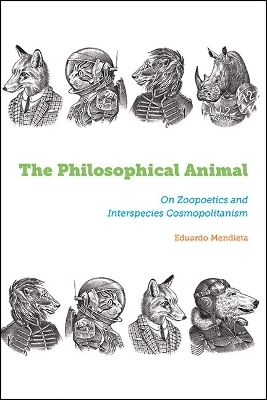
The Philosophical Animal
State University of New York Press (Verlag)
978-1-4384-9811-9 (ISBN)
Humans are animals who fictionalize other animals to asse their "humanness." We are philosophical animals who philosophize about our humanity by projecting images onto a mirror about other animals. Spanning literature, philosophy, and ethics, the thread uniting The Philosophical Animal is the bestiary and how it continues to inform our imaginings. Beginning with an exploration of animals and women in the literary work of Coetzee, famous for his book on the Lives of Animals, Eduardo Mendieta then dives into the genre of bestiaries in order to investigate the relation between humanity and animality. From there he approaches the works of Derrida and Habermas from the standpoint of genetic engineering and animal studies. While we have intensely modified many species genetically, we have not done this to ourselves. Why? Finally, Mendieta deals with the political and ethical implications suggested by this question before ending on an autobiographical note about growing up around so-called animals, and in particular horses.
This book is freely available in an open access edition thanks to TOME (Toward an Open Monograph Ecosystem)—a collaboration of the Association of American Universities, the Association of University Presses, and the Association of Research Libraries—and the generous support of Penn State. Learn more at the TOME website, available at: https://openmonographs.org/. It can also be found in the SUNY Open Access Repository at https://soar.suny.edu/handle/20.500.12648/14967
.
Eduardo Mendieta is Professor of Philosophy and Latina/o studies at Penn State University. He is the author of several books, including Global Fragments: Globalizations, Latinamericanisms, and Critical Theory, also published by SUNY Press.
Preface
Acknowledgments
Introduction: The Poetic Species
I. Ceasing to Be Animal
1. Zoopoetics: Coetzee's Animals and Philosophy
2. Political Bestiary: On the Uses of Violence
3. Heidegger's Bestiary: The Speechless and Unhistorical Animal
II. Not Yet Human
4. Habermas on Human Cloning: The Debate on the Future of the Species
5. Communicative Freedom and Genetic Engineering
6. We Have Never Been Human, or How We Lost Our Humanity: From Habermas and Derrida to Midgley and Haraway by Way of Agamben
III. Toward a Companion Species Ethics
7. Animal Is to Kantianism As Jew Is to Fascism: Adorno's Bestiary
8. Interspecies Cosmopolitanism
9. Bestiaries of Extinction: Anthropodicy or Anthropohippology
Notes
Index
| Erscheinungsdatum | 20.12.2024 |
|---|---|
| Reihe/Serie | SUNY Press Open Access |
| Zusatzinfo | Total Illustrations: 2 |
| Verlagsort | Albany, NY |
| Sprache | englisch |
| Maße | 152 x 229 mm |
| Gewicht | 227 g |
| Themenwelt | Sachbuch/Ratgeber ► Natur / Technik ► Natur / Ökologie |
| Geisteswissenschaften ► Philosophie ► Ethik | |
| Geisteswissenschaften ► Philosophie ► Philosophie der Neuzeit | |
| ISBN-10 | 1-4384-9811-X / 143849811X |
| ISBN-13 | 978-1-4384-9811-9 / 9781438498119 |
| Zustand | Neuware |
| Informationen gemäß Produktsicherheitsverordnung (GPSR) | |
| Haben Sie eine Frage zum Produkt? |
aus dem Bereich


